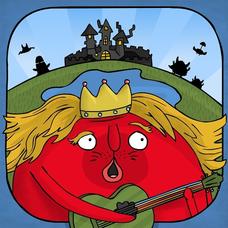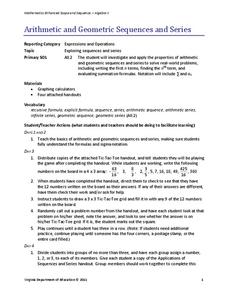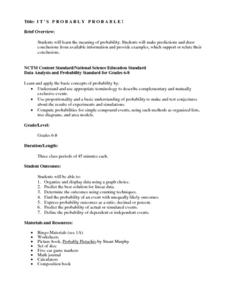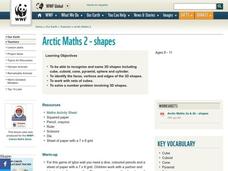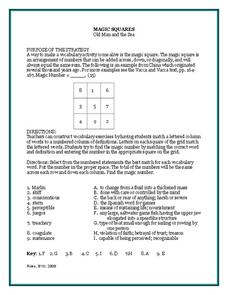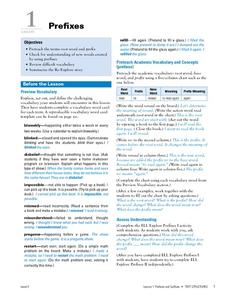Houghton Mifflin Harcourt
Unit 4 Math Vocabulary Cards (Grade 1)
Support math vocabulary using a set of 25 flashcards. The set consists of a variety of bold-faced word cards and corresponding labeled picture cards. Terms include even numbers, regrouping, skip counting, and more.
Houghton Mifflin Harcourt
Unit 1 Math Vocabulary Cards (Grade 1)
Reinforce mathematical vocabulary with the use of flash cards. Each card showcases a boldly typed word as well as a labeled picture representation of the word. Terms include addition, subtraction, greater than, less than, and more!
Curated OER
Math Games for Skills and Concepts
A 27-page packet full of math games and activities builds on algebra, measurement, geometry, fractional, and graphing skills. Young mathematicians participate in math games collaboratively, promoting teamwork and skills practice.
iMagine Machine
The Land of Venn - Geometric Defense
Young mathematicians use their geometry skills to save the Land of Venn in an engaging math game. A fun way to reinforce children's understanding of basic geometric figures and shapes.
Virginia Department of Education
Arithmetic and Geometric Sequences and Series
Examine the importance of sequence and series through contextual situations. Here, learners partake in a five-day unit that begins with the basics of arithmetic and geometric sequences and series. As it progresses, pupils apply the...
Curated OER
Probability Crossword
Make probability fun and test your learners' knowledge of math probability vocabulary. Print out this crossword puzzle and see if they know enough about outcomes and experiments to fill in the blanks. The answer key is attached in...
Attainment Company
Money Skills
Young mathematicians learn to make sense out of money with this collection of skills practice worksheets. From identifying the different coins and bills in the US currency system, to counting money and correctly using the dollar and...
Curriculum Corner
Camping Literacy Pack
Increase camping vocabulary just in time for summer with a camping themed literacy pack. Use word cards and sentence cards to enhance fluency, build vocabulary, and strengthen writing skills. The activities are perfect for centers,...
New Mexico State University
Agrinautica
Individuals play a computer game to terraform planets. Learners add plants, animals, fungi, and minerals to the planet surface by creating numerical expressions that represent the objects. After playing the game for a while, the class...
National Security Agency
It's Probably Probable
Learners make predictions and draw conclusions from given information as they learn the meaning of probability in this vocabulary-rich, integrated activity that presents a variety of teaching strategies to motivate and reach...
Virginia Department of Education
Exponents and Radicals
What is that fraction doing as an exponent? Fun math games prompt learners to practice evaluating radical expressions and expressions containing rational exponents, both in groups and individually.
Water
Global Water Supply Elementary School Curriculum
Water is the focus of an interdisciplinary unit that brings awareness to its daily use around the world and the importance of conservation. Worksheets challenge scholars to match words and definitions, trace, complete a maze, and solve a...
World Wildlife Fund
Shapes
Investigate the properties of three-dimensional figures with this Arctic-themed math instructional activity. Beginning with a class discussion about different types of solid figures present in the classroom, young mathematicians are then...
PBS
Adding Integers
Your sixth and seventh graders deepen their understanding of a number line and adding integers in this concrete, hands-on activity. Learners play "Warehouse Puzzle" and then discuss their game strategies and the characteristics...
Curated OER
The Old Man and the Sea: Magic Squares
Review the vocabulary from Ernest Hemingway's The Old Man and the Sea with a magic squares activity. To find the magic number, readers match the numbers on a grid with the words and definitions from the novel.
EngageNY
Find Solutions to Make Equations True
The truth is always best. Individuals continue to find values that make equations true in the 26th installment of the 36-part module. The only difference is that they now call them solutions to those equations.
EngageNY
Writing and Expanding Multiplication Expressions
Find out what's so standard about standard form. Scholars learn to write multiplication expressions with variables in the 10th activity in a series of 36. They use different symbols for multiplication and translate between standard and...
Illustrative Mathematics
Comparing Numbers
Young mathematicians spin their way to a deeper number sense with this fun, collaborative activity. Using two spinners, one with the numbers 0-9 and the other with the decades 00-90, pairs of students take turns building and comparing...
Virginia Department of Education
Order Up!
Order in the math class! Scholars learn to evaluate expressions using the order of operations. A game has them rolling number cubes to determine numbers to use when evaluating.
Lee & Low Books
First Come the Zebra Teacher’s Guide
Accompany a reading of First Come the Zebra written and illustrated by Lynne Barasch with a teacher's guide equipped with before reading, vocabulary, and after reading activities. Additional social studies,...
Willow Tree
Data Sampling
Some say that you can make statistics say whatever you want. It is important for learners to recognize these biases. Pupils learn about sample bias and the different types of samples.
Perfection Learning
Prefixes, Suffixes, and Root Words/Base Words
Get your class on track with their affixes by covering prefixes, suffixes, and root words in depth. This short three-lesson unit includes vocabulary lists to study, detailed plan procedures, and some accompanying worksheets.
Quizlet
Quizlet
Bring your class's study skills into the 21st century with this digital teaching tool. Offering an easy way to create and share customized sets of flash cards with students, parents, and other educators, this resource is a...
EngageNY
Estimating Probabilities by Collecting Data
Take a spin to determine experimental probability. Small groups spin a spinner and keep track of the sums of the spins and calculate the resulting probabilities. Pupils use simulated frequencies to practice finding other probabilities to...



